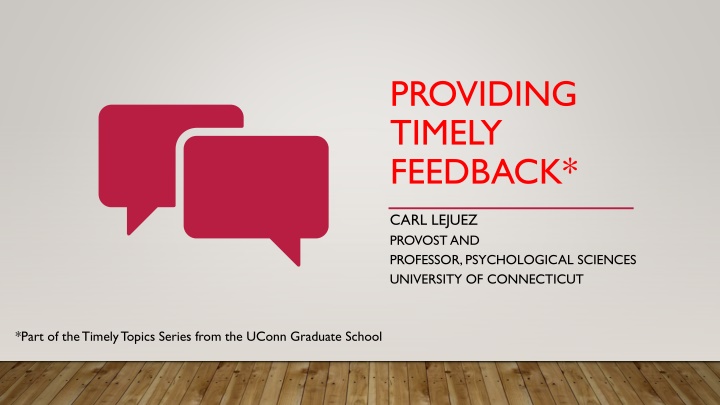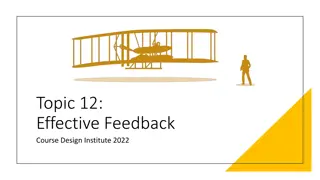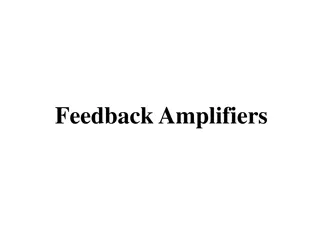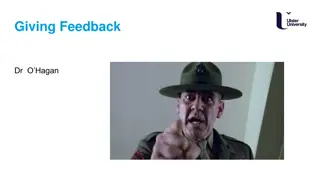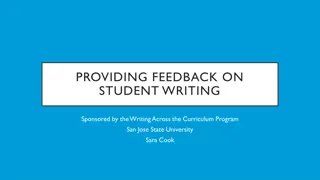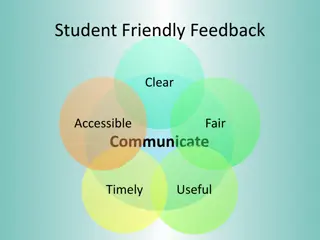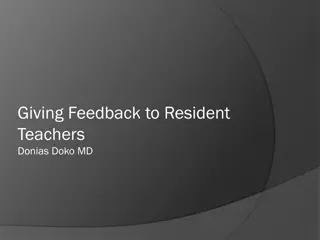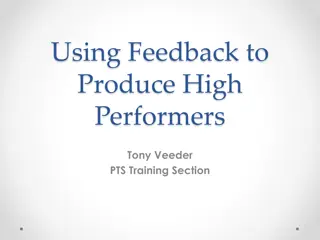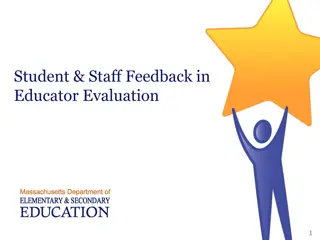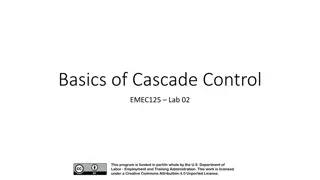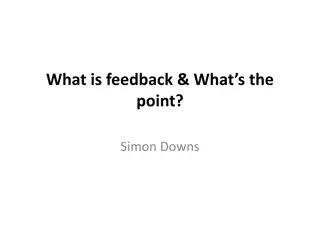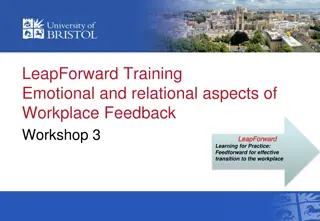Effective Strategies for Providing Timely Feedback in Academic Settings
Explore key features of feedback, including goal-oriented focus, specificity, user-friendliness, timeliness, and consistency. Learn about factors influencing the acceptance and delivery of feedback, along with stages of change in implementing timely feedback practices for students in educational environments.
Download Presentation

Please find below an Image/Link to download the presentation.
The content on the website is provided AS IS for your information and personal use only. It may not be sold, licensed, or shared on other websites without obtaining consent from the author.If you encounter any issues during the download, it is possible that the publisher has removed the file from their server.
You are allowed to download the files provided on this website for personal or commercial use, subject to the condition that they are used lawfully. All files are the property of their respective owners.
The content on the website is provided AS IS for your information and personal use only. It may not be sold, licensed, or shared on other websites without obtaining consent from the author.
E N D
Presentation Transcript
PROVIDING TIMELY FEEDBACK* CARL LEJUEZ PROVOST AND PROFESSOR, PSYCHOLOGICAL SCIENCES UNIVERSITY OF CONNECTICUT *Part of the Timely Topics Series from the UConn Graduate School
3. User Friendly Consider matching feedback approach with student needs - The environment that you thrived in may not be best for others Focus on your impressions (less focus on others impressions) Consider how to use positive feedback to soften the impact - Can occur regularly to build confidence - Can occur as a complement to negative feedback to soften the blow Consider feedback in-person before in-writing if possible Personal responsibility-taking can open students to feedback
4a. Benefits of Regular Consistent Feedback: The Safety Signal Hypothesis
4b. What Makes Feedback Timely: Contiguity vs Contingency
B. Factors Impacting Willingness/Ability to Take/Give Feedback?
Stages of Change Let s revisit the stages of change model from my previous Timely Topics presentation (don t worry if you missed that) Are you where you want to be with your timely feedback to students? Are your students where you want them to be with their acceptance of timely feedback?
Stages of Change Let s revisit the stages of change model from my previous Timely Topics presentation (don t worry if you missed that) Are you where you want to be with your timely feedback to students? Are your students where you want them to be with their acceptance of timely feedback? Next, let s revisit Why Worksheets (functional analysis) to try and understand why we (and our students) may not be where we want them to be?
Why Worksheet to Understand a Students Struggle in Taking Effective Timely Feedback Trigger (2) Thoughts (3a) Feelings (3b) Current: Fast approaching deadline Fear My only chance to pass is to use others ideas Recent: Not getting enough sleep and being pulled in too many directions I m not really plagiarizing if I change some of the words Overwhelmed Tired Early: Early life criticism that leads one to doubt their own ideas Problem Behavior (1) (START HERE!) Problem Behavior Positive Consequences (4a) Problem Behavior Negative Consequence (4b) Unsatisfactory academic work: - Not citing larger literature - Plagiarizing Meet the deadline All the long-term consequences of getting caught Poor interpersonal Interactions: - Showing up unprepared for discussions - Creating un-inclusive environment If plagiarism is undetected, the odds of it being viewed as satisfactory may be higher Alternative Approach (5) Healthy Behavior Positive Consequences (6a) Healthy Behavior Negative Consequence (6b) Complete work earlier and rely only on own ideas Less likely to be guilty of plagiarizing The ideas may not be good enough
Why Worksheet to Understand a Mentors Struggle in Giving Effective Timely Feedback Trigger (2) Thoughts (3a) Feelings (3b) Current: Other demands on your time This was a good meeting and I don t want to spoil it by being negative Exhausted Recent: Not enough sleep Anxiety about how it will be received I literally have no idea how to provide feedback in a way that will be useful Early: Parents punished any efforts to provide feedback to them Guilt regarding any of our own shortcomings I m worried I will not be able to keep my cool when giving feedback Problem Behavior (1) (START HERE!) Problem Behavior Positive Consequences (4a) Problem Behavior Negative Consequence (4b) Feedback is harsh and inconsistent Can stick to good things in the meeting The issues may get worse Feedback includes labeling and is often done in public settings I avoid the potential of making the situation worse I will know I didn t do the right thing for the student Absence of timely feedback Alternative Approach (5) Healthy Behavior Positive Consequences (6a) Healthy Behavior Negative Consequence (6b) Try to provide regular positive feedback and consider at each scheduled meeting if there is useful critical feedback I can provide I am supporting my student It will take a lot of effort and it could go wrong I will be doing something that is hard for me but important for my growth as a mentor
Sli.do Questions #676971 https://app.sli.do/event/mn2m4bon
C. Examples of the Timely Feedback Process (1/5): Dream Scenario
C. Examples of the Timely Feedback Process (2/5): Two Steps Forward, One Step Back
C. Examples of the Timely Feedback Process (3/5): Failure to Launch
C. Examples of the Timely Feedback Process (4/5): Lemonade from Lemons
C. Examples of the Timely Feedback Process (5/5): Garbage In / Garbage Out
Timely Topics Using Annual Reviews to Help Graduate Students Succeed Wednesday, October 27, 2021 1pm-2pm Register View All Timely Topics Events
Timely Topics Updating Your Catalog Copy and Using the GPAR System Wednesday, November 10, 2021 11am-12pm Register View All Timely Topics Events
GradSlate Training GradSlate is The Graduate School s CRM and admissions software. Learn more about how your department can use it during this year s GradSlate Training Series. Register for GradSlate Trainings Admissions and Recruitment Info
D. Gray Area Questions (1 D. Gray Area Questions (1- -3) 3)
D. Gray Area Questions (4 D. Gray Area Questions (4- -6) 6)
D. Gray Area Questions (7 D. Gray Area Questions (7- -9) 9) - Know when you need to step back (you can t solve everything) - Know when and how to establish boundaries (for own sake and for sake of mentee) - Know when it s time to refer the student to other support resources
Breakout Conversations on Gray Area Topics Pick 1 and discuss for 10(ish) minutes
E. Domains Checklist for Expectation Setting and Timely Feedback
F. Resources if You are Stuck https://grad.uconn.edu/faculty-staff-resources/advising-mentoring/ https://rackham.umich.edu/downloads/how-to-mentor-graduate-students.pdf https://shared.ontariotechu.ca/shared/faculty/grad/assets/Publications/supervisor-student- conversation/supervisor_conversation_starters.pdf
